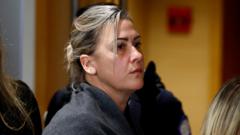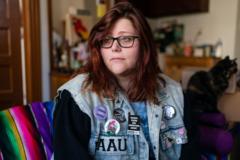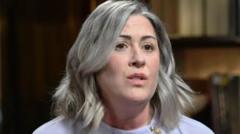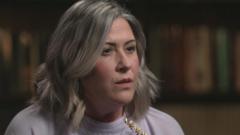In the aftermath of a high-profile trial in France that condemned Dominique Pelicot for the brutal rapes of his wife, Gisèle, daughter Caroline Darian reveals her own painful suspicions of having been victimized as well, highlighting the complexities of trauma and the quest for justice.
Daughter Seeks Justice Amidst Father's Conviction for Rape of Mother

Daughter Seeks Justice Amidst Father's Conviction for Rape of Mother
Caroline Darian, the daughter of Gisèle Pelicot, speaks out about her own unresolved trauma while her father is convicted alongside 50 others for the abuse of her mother.
In a chilling revelation following his conviction, Caroline Darian emerges from the shadows of her mother’s high-profile case against Dominique Pelicot, her father, and 50 other men. The trial, which became a pivotal moment for the feminist movement in France, resulted in guilty verdicts for systemic abuse and rape inflicted on Gisèle Pelicot, but left Caroline grappling with her unaddressed trauma.
On the day of the verdict, Caroline was engulfed by a fervent crowd of supporters celebrating her mother’s courage, but she was unable to share in their joy. For her, the trial underscored a deep personal tragedy: a haunting belief that her own experience as a potential victim remained overlooked. Desperation filled her heart as she processed the testimonies that dominated the courtroom, leading her to prioritize her mother’s narrative over her own.
Reflecting on the weight of the trial, Caroline expressed regret that her father, convicted of appalling abuses against her mother, was not held accountable for allegations against her. “Dominique was not tried for what he did to his daughter,” she lamented, seeking a form of closure that the proceedings failed to provide. “He wasn’t even confronted adequately for what he did to his daughter.”
The trial detailed how Dominique Pelicot had subjected Gisèle to years of drug-induced sexual violence, using her incapacitation to exploit her forgotten dignity. Yet, amidst the focus on her mother’s trauma, Caroline felt her own struggles were rendered invisible, leaving a deep wound in an already complex family narrative.
As she shares her experiences, Caroline seeks not only justice for herself but a broader recognition of the hidden stories that often linger in the shadows of public trials. Her journey underlines the intricate realities faced by survivors and the urgent need to confront not only high-profile cases but the myriad untold stories of abuse that persist.




















